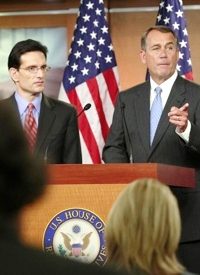
Among the top priorities for some GOP House leaders is challenging a raise of the nation’s debt ceiling. On Thursday, House Republicans told the White House that its request to raise the debt ceiling, which currently stands at $14.3 trillion, will not be considered without federal spending cuts.
Fox News reports,
Speaker John Boehner made the challenge as the new GOP majority voted to cut funding for House members’ own offices and committee operations by $35 million. Rank and file Republicans described that vote as a mere down payment on a much more ambitious assault on record federal deficits.
Colorado’s Republican Representative Cory Gardner indicates, “It’s not massive. But it is monumental.”
Boehner contends that he will maintain his campaign promise to cut federal spending by a minimum of $100 billion this year. “No ifs, ands or buts about it,” he declared.
According to Treasury Secretary Tim Geithner in an address to congressional leaders, the federal government is near exhausting its borrowing authority of $14.3 trillion between March and May. Fox News explains:
He said the precise date depends on the economy, tax receipts and other matters, but added, “It will be necessary for Congress to act by the end of the first quarter of 2011.” Without an increase, he said the government would eventually default on its obligations and “catastrophic damage to the economy could result.”
Conservative pundit Glenn Beck contends, “Maybe saying no to more debt would send the message to everyone that there is no more money. Maybe more importantly, like an individual that loses his job or has to declare bankruptcy, it would force a national conversation about our real priorities and how they should be funded.”
Some House GOP leaders seem to agree. House Speaker John Boehner declared:
The American people will not stand for such an increase unless it is accompanied by meaningful action by the president and Congress to cut spending and end the job-killing spending binge in Washington. While America cannot default on its debt, we also cannot continue to borrow recklessly, dig ourselves deeper into this hole, and mortgage the future of our children and grandchildren.
House Majority Leader Eric Cantor of Virginia has indicated, however, that he would be willing to increase the debt ceiling if it is accompanied by lower government spending.
Similarly, Senate Republican leader Mitch McConnell has stated that an increase to the debt ceiling “will not be without some strings attached if it happens, because they’re going to have to seriously address spending and debt. The American people want it. They expect it.”
It is the responsibility of Congress to determine via legislation whether they should increase the debt ceiling. In the past, such bills have led to contentious battles in Congress. Perhaps the most notable examples of such showdowns took place in 1995 and 1996 during the Clinton administration when Newt Gingrich led the GOP opposition to raising the debt ceiling. The showdowns resulted in only short-lived government shutdowns, and eventually the Republicans succumbed to the demands of President Clinton.
The House, however, has unilateral authority to cut its own spending, and GOP leaders have set that cut at 5 percent, totaling $35 million, by a vote of 410 to 13.
Representative Hal Rogers of Kentucky notes, “We will carry out the most expansive reduction of discretionary spending in the history of our nation.”
Members of the Tea Party Caucus such as Mike Lee of Utah and Rand Paul of Kentucky have declared their interest in fighting against a debt ceiling increase, particularly if it is not accompanied by federal spending cuts.
Meanwhile, Democratic Senator Dick Durbin of Illinois took the opportunity to criticize Republicans: “Using this doomsday scenario and putting the American economy at risk [—] I don’t think is a responsible way to govern.”
While President Obama has expressed an interest in federal spending cuts, his assertions have been general.
So whether the debt ceiling is raised remains to be seen. It’s worth noting, however, that today’s debt stands at 291 times higher than the original limit, set at $43 billion. In President Obama’s first two years in office, the debt limit has already been raised three times. The most recent increase did not secure a single GOP vote, indicative of the Republicans’ allegedly staunch opposition to federal spending.
Will Republicans stay true to their word?
Photo: House Speaker John Boehner of Ohio, right, accompanied by House Leader Eric Cantor of Va., gestures during a news conference on Capitol Hill, Jan. 6, 2011: AP Images




